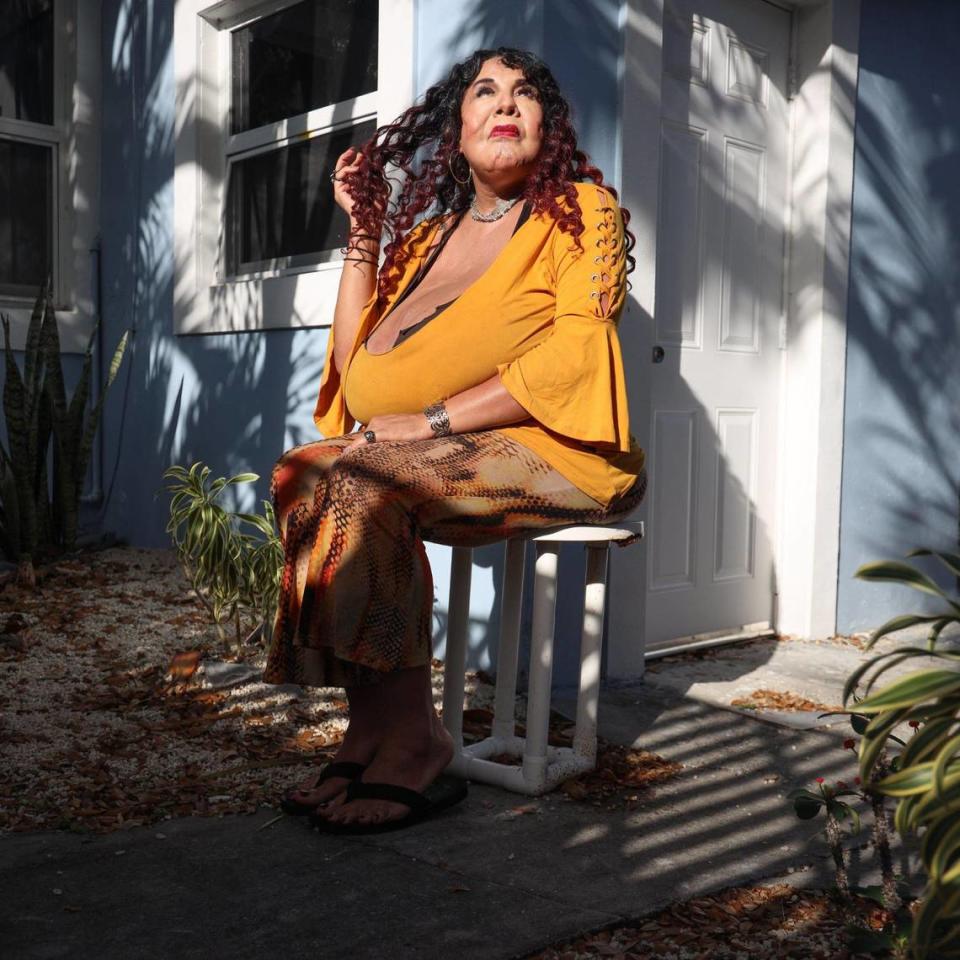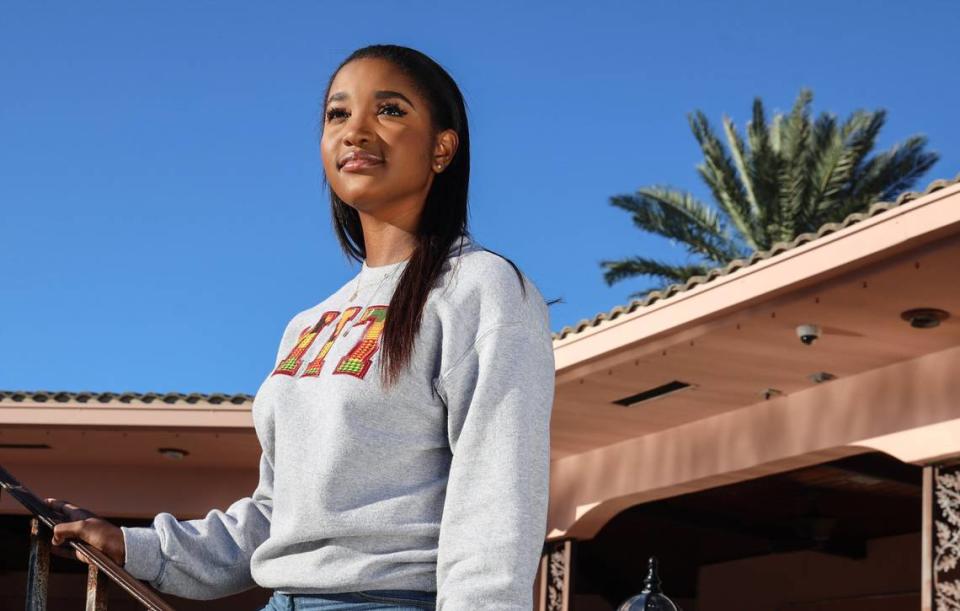‘I am charged from my ancestors.’ How 28 South Floridians describe their Blackness
- Oops!Something went wrong.Please try again later.
As Rajee Narinesingh sat in the baking South Florida sun, tears began to stream down her face while reflecting on her ancestors’ grueling voyage from Africa generations ago, and their enslavement on plantations in the Americas.
A Black trans woman, Narinesingh has faced her own struggles: bullied as a child, ostracized by family members and brutally attacked three separate times. The DNA that flows through her veins gives her power, she says.
“It’s the strength that I carry from [my ancestors] that helps me get through,” said Narinesingh, wiping away tears.
SHOWCASING BLACK LIVES IS THE MIAMI HERALD’S OBLIGATION
This past year brought an array of challenges to get through — for the nation as a whole and Black Americans in particular. The pandemic has disproportionately impacted Black Americans; vaccine acceptance has been dampened by a history of government abuse. The murders of George Floyd and Breonna Taylor punctuated a history of Black deaths at the hands of police. The insurrectionists who stormed the Capitol brandished symbols of white supremacy, bringing racial hatred to a fever pitch.
In this Black History Month, drawing courage from the past was a common theme among 28 Black South Floridians interviewed over the past month for a Miami Herald Instagram project. The individuals represented a slice of the region’s 1 million-plus Black Americans — well-known and private, married and single and gay — that presents a living history of Black South Florida.
Our question was simple: What does Blackness mean to you, and how does it influence your mission, your goals, your life? As the Miami Herald team discovered, the answers were complex and varied, often shaped by the person’s roots — in the U.S., Africa, the Caribbean and South America.
Yet some ideas were common: the importance of perseverance and a passion for empowering the next generation.
Interviews by reporter C. Isaiah Smalls II and images by visual journalists Carl Juste and Daniel Varela appear on the Miami Herald’s Instagram page. The project was produced by Miami Herald editor Forrest Milburn.

‘We have a history of charging through adversity’
The perseverance that enabled Black Americans to survive the Middle Passage and the rigors of segregation has been passed down from generation to generation. For many, that same spirit of resoluteness is an ongoing necessity.
“We have a history of charging through adversity and forging ahead in spite of [our circumstances] and I have responsibility to carry that tradition on,” said Derek Fleming, the managing partner at Red Rooster Overtown.
Dr. Henri Ford agrees. “We see that Black and brown people who are disproportionately being affected by the ravages of COVID-19, a reflection of the structural inequities that have existed for so long,” said Ford, the dean of University of Miami Leonard M. Miller School of Medicine. “So we cannot relent; we have to continue to fight.”
For others, like Miami Edison High teacher Kalyn Lee, resiliency inspires her to educate students about the reality of the Black experience.
“I am charged from my ancestors to make sure that I am dispelling the myths of what Blackness is seen overall in society,” said Lee., standing in front of a mural of local civil right activist M. Athalie Range.
Drawing from the wisdom of Zora Neale Hurston, blackness doesn’t simply revel in tragedy, said entrepreneur Yvonne Rodriguez. It’s an asset, one that demands constant celebration.
“We are a walking monument to our ancestors,” said Rodriguez as her twin Yvette puffed on a Tres Lindas Cubanas cigar, a company that the sisters co-own.
“My sister and I, we’re in a constant celebration of the miracle that is us.”

‘Inspire the next generation’
For many of the 28, Blackness didn’t just mean drawing strength from the past; it also meant working to create a better tomorrow.
As a site director for Breakthrough Miami, Webber Charles fights for equality in after-school programs that encourage children from low-income communities, regardless of color, to aspire beyond their current surroundings.
“Black and justice are inseparable,” he said.
“Whether you’re Nicaraguan, whether you’re Honduran, whether you’re Cuban, whether you’re white, Anglo — the work that I aim to do in this community, as a Black man, is to not only better the living conditions of young Black people as a whole but everyone,” Charles said.
After losing her 17-year-old son to a vigilante in 2012, it was only natural the Sybrina Fulton would focus on opportunities for the next generation, though the Trayvon Martin Foundation.
Martin’s killing “made me more passionate about how African Americans [and] people of color are being treated and what I can do to be a part of this whole dynamic,” Fulton said, standing beneath the street sign dedicated to her son.
That same passion also motivates Evan Forde, the first African American scientist to do a research dive on a submarine. As one of the handful of Black oceanographers, Forde invariably drew the job of leading Black History Month activities at the National Oceanic and Atmospheric Administration every February. The years have begun to weigh on Forde, who admitted to being “tired” of being the Black spokesperson.
But the past 12 months have ignited something within him.
“Until I successfully inspire the next generation of Black scientists and community activists, then there will be nobody to speak for us,” said Forde as he reclined in front of the NOAA building in Virginia Key.
For Narinesingh, the simple act of openness has inspired countless others to be themselves.
With violence against the trans community reaching a record high in 2020, shopping for groceries can be dangerous for Narinesingh and those like her. But, influenced by the sacrifices of generations before her, Narinesingh said hiding is not an option.
“Isn’t it about making it better for the next generation to come?” Narinesingh said.

EXCERPTS
Below are excerpts from interviews for the Miami Herald Black History Month Instagram project. Some have been edited for clarity:
Desmond Alufohai, Miami International Airport director of protocol & international affairs:
“It’s been a long, long walk from my tiny village in Africa to where I am today. My Blackness means pride because I stand on the shoulders of so many achievements, sacrifices of those ancestors.”
Amaka Amalu, Nigerian-American engineer/ founder of Tech Girl Power:
“Not only are we trying to increase diversity in STEM, we’re also trying to teach girls the tools that they need to thrive in this industry.”
Leatha Bush, Survivors Affected by Violence The Jack Brown III Foundation founder:
“I’m inspired by Barack Obama, Michelle and, most of all my mother Mary Sherill-Sheffield. My mother raised 12 kids in Scott Projects. She never gave up. She was a single mother.”
Isaac Bruce, former NFL receiver/ Pro Football Hall of Fame class of 2020:
“Blackness was something that we placed on you, given to you... so knowing that that was all placed, it shoots me forward to my light of being awakened, being restored and being unified.”
Luther “Uncle Luke” Campbell, hip-hop legend and community advocate:
“Black is beautiful. I love it. It’s all shades. Blackness is just like Baskin-Robbins. You can get all flavors: chocolate, lightskin, darkskin, vanilla, light bright and damn near white.”
Webber Charles, Breakthrough Miami site director
“The work that I aim to do in this community as Black man is to not only better the living conditions of young Black people as a whole but everyone because Black and justice are inseparable.”
Alejandro “Carela” Diaz, Dominican-American artist/ entrepreneur:
“No matter what anyone puts in front of us, we’ll conquer it. You can’t divide us, shake us down or anything.”
Edouard Duval-Carrié, Haitian-American visual artist:
“There has been so much rich history that has been either erased, either forgotten or swept under the carpet.”
Derek Fleming, managing partner of Red Rooster Overtown:
“We have a history of charging through adversity and forging ahead in spite of and I have responsibility to carry that tradition on.”
Dr. Henri Ford, dean, University of Miami Leonard M. Miller School of Medicine:
“I am the product of the sacrifice of many others who have come before me to make it possible for this Haitian-born Black man to be sitting today as dean of the Miller School of Medicine of the University of Miami.”
Evan B. Forde, oceanographer, National Oceanic and Atmospheric Administration:
“This is no time for me to think I’ve done enough.”
Sybrina Fulton, activist/ Trayvon Martin Foundation founder:
“My Blackness has transformed since losing my son in that it made me do things with a purpose, it made me more mindful. It made me more passionate about how African Americans [and] people of color are being treated.”
Danielle Geathers, first Black woman to be student body president at MIT:
“I want Black students coming after me to feel comfortable taking risks, to feel comfortable being ostracized for speaking out.”
Felecia Hatcher, executive director of the Center for Black Innovation
“My Blackness means being builders, creators, entrepreneurs and having a long legacy and history of doing so.”
Elle Hayes, McDermott, Will & Emory attorney:
“I am proud to come from a lineage of Black women for they are the shoulders that I have stood on to accomplish my goals.”
Dr. Cheryl Holder, Florida International University Herbert Wertheim College of Medicine interim associate dean:
“In many ways that’s what we do when we see Black people or Brown people; we bring what we think they are to them.”
Marilyn Holifield, Holland & Knight partner/ first Black woman partner at a major law firm in Florida:
“My Blackness means my family. My grandparents who were in Mississippi and their parents fought off the Klu Klux Klan to defend their 500 acre farm.”
Kalyn Lee, 2020 Miami-Dade County Rookie Teacher of the Year:
“We have to make sure that we have the opportunity to put our voices and our bodies in places that they’re typically not allowed to be in.”
Tarell Alvin McCraney, playwright/ Yale School of Drama playwriting chair:
“My Blackness means tight hugs, peppermint wrappers. It means quarter juices from the corner store. ”
Ann McNeil, first Black woman to own construction company in Florida:
“That’s what Blackness means to me: not being limited by race, by gender, by color.”
David Muir, the Island SPACE Caribbean Museum co-founder and president:
“At home, in South Florida and in America, my Blackness is always at play. I have to be cognizant of how I am being perceived by those around me and so I have to really work to make sure that I am better than any other competition.”
Rajee Narinesingh, transgender actress and activist:
“When you’re tired and you’re about to fall and give up, keep going because that’s the only way you can taste freedom. I swear I carry that with me. The ancestors, their lives and what they went through should not be in vain because of people like me who get strength from what they went through.”
Felicia Persaud, Guyanese-American journalist/ entrepeneur:
“As a Black immigrant to this country I feel I am special, I am beautiful, I am royal, I am exceptional.”
Isis Roberts, African Heritage Cultural Arts Center arts director:
“This is the perfect time where we’re able to take our creativity and make it our own.”
Yvonne Rodriguez, co-owner of Tres Lindas Cubanas Cigars:
“We are a walking monument to our ancestors.”
Jeffery A. Salter, Miami-based photographer:
“I can only go up as a Black person because of the legacy I’ve been given.”
Franklin Sirmans, Perez Art Museum Miami director:
“Our position is so critical to the discussion of Blackness in the world that we should be a leader in that conversation.”
Teri Williams, president/ chief operating officer of OneUnited Bank
“Everything I do is really for our community.”

